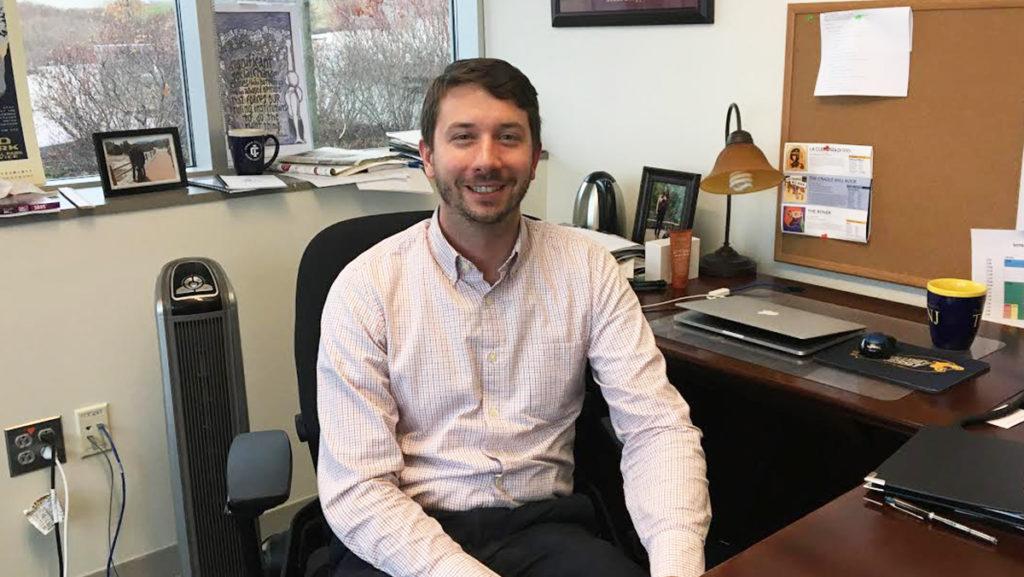Since assuming his new position as the director of the Center for Civic Engagement at the end of the Fall 2016 semester, David Harker is focusing on connecting the various service learning projects across the Ithaca College campus and amplifying community partnerships to best serve the area.
Following a year of controversy, Patricia Spencer, the former faculty director for service learning in the Office of Civic Engagement, stepped down after claiming the college violated an agreement regarding her administrative position and saying she felt a lack of support from the administration. The center is back open with a new name and structure.
After studying sociology in undergraduate and graduate school, Harker began his career in civic engagement at Colorado College, where he was the director of the Collaborative Community Engagement, specializing in long-term student service learning.
Print Layout Editor Sophia Tulp spoke with Harker about his goals for the center, previous challenges it has faced and its plans.
This interview has been edited for length and clarity.
Sophia Tulp: What are your vision and goals for the Center for Civic Engagement?
David Harker: The name change … is kind of reflective of the idea that part of the mission … is to be kind of the hub for civic engagement work. There’s so much great work going on already with students, with faculty across the schools. So the goal is for this office to be a connecting point and to be a resource for the work that has been going on. Something that has been really integral to IC education has been students involved in the community, applying their education, the theory, the things they are learning in the classroom, to the real world. The first part of the vision is to support the work that is already going on, be a resource for that and help make sure we’re doing that work really well. … How are we fostering and supporting relationships and partnerships with community partners? … Can we connect some of the different projects going on around campus … or the projects year to year so we keep building … developing institutional relationships between IC and community partners?
ST: What is your philosophy on civic engagement, and how do you hope to instill that and shape the outlook at Ithaca College?
DH: Projects where students are learning, creating a positive impact on the community or meeting real community needs and creating projects where everyone is kind of learning together are the ideal for me. … You have to be able to put in the time, invest the resources, the energy, so people understand their responsibilities, the commitment, [and] have really good communication in that. … I tend to focus on depth and quality … deep relationships between the campus partners and community partners, putting in the investment to making sure, up front, each side understands what they really want out of it.
ST: What are you most enthusiastic about initiating or creating?
DH: My strategy so far has been to learn as much as I can. … First step has been figuring out what’s already going on at IC, and how do we support that? Over time, that also leads to figuring out where are the gaps, and how do we fill those? … Some things that are a really big focus for me right now are how are we making sure that all students who are doing community-based work are really well–prepared to do that? How are we offering training and workshops for students about what does it really look like when you enter into a community and … how are you thinking about differences in privilege and power and social identity? … Another is figuring out transportation … making sure that we have ways to get students there. What do the structures for that look like?
ST: What do you think will be your biggest challenge?
DH: The challenge is the same thing that I am excited about, is making those connections. … Even if everyone is on board and excited about collaborating, there is a lot to figure out and a lot of logistics. … It’s just figuring out the exact hows.
ST: As I’m sure you are aware, there has been a history of challenges with the [CCE]. The former director left due to problems with support from the administration and compensation–contract issues. Do you foresee any of this being an issue?
DH: Since I’ve been here, I’ve felt nothing but support. … This phrase I’ve heard a bunch of times is “community-engaged work is in the DNA of IC.” There have been a lot of challenges … especially in the last year, of figuring out exactly what that looks like, but at the heart of it, this work, I think, is really well–supported. And I think that coming in with a blank slate knowing that there were challenges last year and a lot of unhappiness with how it all went down, people have been really willing to say, “This is the next chapter of this”. … We have a lot of great opportunities moving forward. … I’m really excited to work with the next president. She seems really dedicated to community-engaged work.
ST: The [CCE] used to be over in the Campus Center. Now it’s in the Peggy Ryan Williams Center. It’s sort of moved away from the student center. Does this affect the center at all? Why the move?
DH: I think there is an intentional effort to make PRW in general a little bit more of a student-facing, more accessible, exciting place for students. … That’s sort of the same reason that honors moved here, too. That connection is another reason. … It’s intended for these offices to work really closely together. … I think [PRW] has been seen as a little bit of a scary, intimidating administrative space, so we have worked really hard … to get students involved, make it a really warm, inviting place to be.







